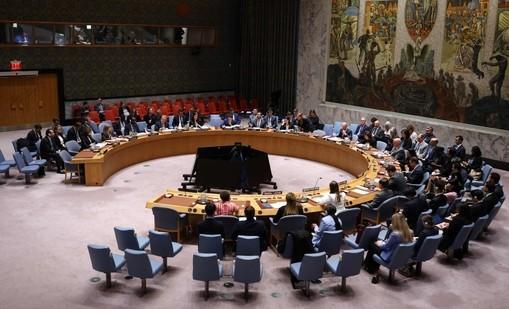
Title: Was LeT involved? UNSC asks Pak on J&K attack, refuses to accept ‘false flag’ claim
The United Nations Security Council (UNSC) has refused to accept Pakistan’s “false flag” narrative on the recent Pahalgam attack in Jammu and Kashmir, which left several tourists injured. In a closed-door meeting requested by Pakistan, UNSC members questioned whether the terrorist outfit Lashkar-e-Taiba (LeT), based in Pakistan, was likely to be involved in the attack.
Pakistan had initially claimed that the attack was a “false flag” operation, meant to discredit its government and create unrest in the region. However, UNSC members were not convinced by this narrative and instead, raised concerns about the targeting of tourists based on their religion.
The meeting, which took place behind closed doors, saw UNSC members expressing their concerns about the growing trend of terrorism in the region and the need for Pakistan to take concrete steps to curb the activities of terrorist outfits like LeT.
Pakistan’s “false flag” narrative was met with skepticism by UNSC members, who pointed out that the attack was carried out in a popular tourist destination, and the victims were mostly foreigners. The fact that the attackers targeted tourists, who were not even remotely connected to the Kashmir conflict, further raised suspicions about the involvement of a terrorist outfit.
UNSC members also expressed concern about the lack of cooperation from Pakistan in investigating the attack and bringing the perpetrators to justice. Pakistan’s reluctance to share information and evidence with the international community has only added to the suspicions about its involvement in the attack.
The Pahalgam attack is the latest in a series of terrorist attacks that have targeted tourists and civilians in Jammu and Kashmir. The region has been facing a surge in violence in recent months, with terrorist outfits like LeT and Jaish-e-Mohammed (JeM) carrying out frequent attacks.
LeT, which was founded by Hafiz Saeed, a Pakistani terrorist, has been responsible for several terrorist attacks in India, including the 2008 Mumbai attacks that killed over 160 people. The outfit has been banned by several countries, including the United States, and has been designated as a terrorist organization by the UN.
The UNSC meeting came as a response to a request from Pakistan, which had claimed that the Pahalgam attack was a “false flag” operation aimed at destabilizing the country. However, UNSC members were not convinced by Pakistan’s narrative and instead, called for a thorough investigation into the attack.
The meeting also saw UNSC members calling for greater cooperation from Pakistan to combat terrorism in the region. The members emphasized the need for Pakistan to take concrete steps to curb the activities of terrorist outfits like LeT and JeM, and to hold those responsible for terrorist attacks accountable.
In a statement, a UNSC member said that the meeting was “a wake-up call” for Pakistan to take concrete action against terrorism. “We have asked Pakistan to take concrete steps to curb the activities of terrorist outfits like LeT and JeM, and to hold those responsible for terrorist attacks accountable,” the member said.
The meeting was seen as a major setback for Pakistan, which had hoped to use the UNSC platform to deflect attention from its own role in promoting terrorism in the region. Instead, UNSC members called for greater transparency and cooperation from Pakistan to combat terrorism.
The Pahalgam attack has once again highlighted the gravity of the situation in Jammu and Kashmir, where terrorist outfits like LeT and JeM continue to carry out attacks with impunity. The attack has also raised concerns about the safety and security of tourists and civilians in the region.
As the UNSC meeting underlined, it is imperative that Pakistan takes concrete steps to curb the activities of terrorist outfits like LeT and JeM, and to hold those responsible for terrorist attacks accountable. The international community must also continue to pressure Pakistan to take action against terrorism and to cooperate fully with investigations into terrorist attacks.
Sources:



